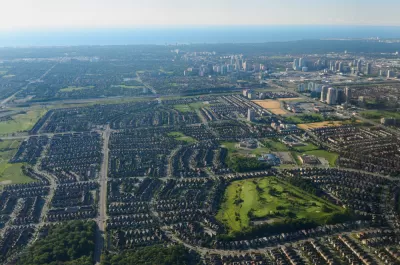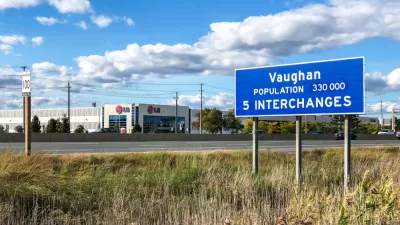An old way of doing municipal business—generating development fees by opening farmland to development—is no longer paying dividends. Mississauga, Ontario serves as a cautionary tale for the bottom line of sprawl.

Mississauga, Ontario developed horizontally for decades. Now some say it should serve as a cautionary tale as parts of the province consider whether to expand urban growth boundaries.
Oliver Moore reports on the moment of reckoning in Mississauga, Ontario, where developments are planned on the final pieces of untouched land in the city.
"The city was once a bedroom community of Toronto so synonymous with suburbia that its long-time mayor was known as the Queen of Sprawl," according to Moore. While the city has started to build up, it also continued to build out.
The story of sprawl is common in Southern Ontario, according to Moore. "Sprawl is also being embraced enthusiastically still by city leaders across Southern Ontario. And as provincial politicians at Queen’s Park push for the expansion of many municipal boundaries, in the name of helping home affordability, observers warn that Mississauga’s experience should be a red flag." Opponents of ongoing sprawl say that previous development patterns were made in a different era of car dependence, and the time has come to "fix the expensive mistakes of the past."
The article includes documentation of how expensive Mississauga has become: "With diminishing prospects for more sprawl – and the associated fees it generated – Mississauga in 2012 instituted a special levy to try to pay down the snowballing bill for infrastructure repairs. Property taxes also started to rise dramatically in the same decade."
In November, regional leaders in the York region, located on the other end of the Toronto metropolitan area, voted to change the designation of 1,400 acres of its greenbelt from agricultural to rural.
FULL STORY: Mississauga a ‘cautionary tale’ as cities sprawl out across Southern Ontario

Maui's Vacation Rental Debate Turns Ugly
Verbal attacks, misinformation campaigns and fistfights plague a high-stakes debate to convert thousands of vacation rentals into long-term housing.

Planetizen Federal Action Tracker
A weekly monitor of how Trump’s orders and actions are impacting planners and planning in America.

In Urban Planning, AI Prompting Could be the New Design Thinking
Creativity has long been key to great urban design. What if we see AI as our new creative partner?

Massachusetts Budget Helps Close MBTA Budget Gap
The budget signed by Gov. Maura Healey includes $470 million in MBTA funding for the next fiscal year.

Milwaukee Launches Vision Zero Plan
Seven years after the city signed its Complete Streets Policy, the city is doubling down on its efforts to eliminate traffic deaths.

Portland Raises Parking Fees to Pay for Street Maintenance
The city is struggling to bridge a massive budget gap at the Bureau of Transportation, which largely depleted its reserves during the Civd-19 pandemic.
Urban Design for Planners 1: Software Tools
This six-course series explores essential urban design concepts using open source software and equips planners with the tools they need to participate fully in the urban design process.
Planning for Universal Design
Learn the tools for implementing Universal Design in planning regulations.
Gallatin County Department of Planning & Community Development
Heyer Gruel & Associates PA
JM Goldson LLC
City of Camden Redevelopment Agency
City of Astoria
Transportation Research & Education Center (TREC) at Portland State University
Jefferson Parish Government
Camden Redevelopment Agency
City of Claremont



























